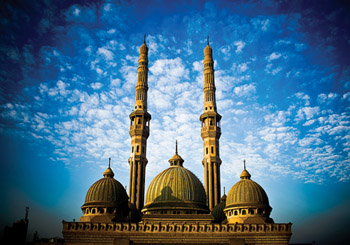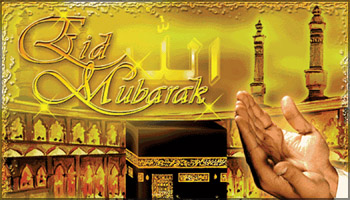Feasting after fasting
Muslims all over the world will be celebrating the
occasion of Eid on October 1:
By Panchamee HEWAVISSENTI
[email protected]

|
“Eat and drink until the
white thread of dawn appears to you distinct from its black
thread. Then strictly observe the fast until nightfall”. (Surah
Al-Baqarah, 2: 187) |
When the blessed month of Ramadhan arrives, it’s been made imperative
upon all those who are believing in Allah to observe fast from Fajr
(dawn) until Maghrib (sunset). Fasting in Ramadhan is a unique moral and
spiritual attribute. The wisdom behind fasting is to get closer to Allah
by attaining piety. It’s considered an act of worship that testifies to
total submission and obedience. The hardships and pangs of hunger a
believer endures during the period of this obligation is trifle when the
noble objective of attaining Allah’s pleasure is taken into
consideration which would be a great reward in the hereafter.
To fast in the blessed month of Ramadhan requires endurance and
perseverance to a great deal unlike other ordinary days. Muslims
celebrate the Eid-ul-fitr as a sign of appreciation for Allah Subhanu Wa
Ta’ala for providing them with the physical ability to endure hunger and
thirst, to wake up early morning for Thahajjud prayer and keep vigil
performing Tharaweeh prayers at night. And also to have Sahoor early
morning and reciting Quran etc. Fasting is a divine gift for Muslims to
uplift themselves in various aspects in life such as to improve their
personal demeanours, attitudes, character and moral consciousness.
The feast of Eid-ul-fitr is a kind of appreciation and praise to
Allah Subhanu Wa Ta’ala who gave that precious opportunity to His
slaves. This is also a sign of praise to Almighty Allah who provided
Muslims with the valuable opportunity to obliterate their sins and atone
for them which were accumulated throughout the year. And of course,
during Ramadhan, believers are steadfast to atone, for the faulty deeds
they have done, through religious training programmes. Allah says in the
Quran, “Indeed the right spiritual training is superior and better than
any other type of training.” (73:6)
Eid: sign of unity
 The
Muslim Ummah belongs to Allah Subhana Wa Ta’ala. So, each and every one
of them in that community is a slave of the Almighty. Therefore there’s
no differentiation in language, nationality or colour of the skin in
slaves of Allah. The unity of the Muslim Ummah is explicitly exhibited
during the month of Ramadhan; Muslims must fast and break fast at
prescribed times. This is the unity in the Muslim Ummah which
distinguishes it from other communities. No one is powerful enough to
altar the fasting month from Ramadhan to any other, whether for
convenience or for other reasons. No single Muslim is exempted from
fasting on the basis of wealth, position, or status in society. Muslims
all over the world are equal in the sight of Allah. There’s no leader in
the world who can unite Muslims politically, socially or economically
without teachings of Islam and without the concept of “La Ilaha Illallah
Muhammadur Rasoolullah”. Islam is therefore the only binding force for
Muslims to be brought together and to be closer to one another. The
Muslim Ummah belongs to Allah Subhana Wa Ta’ala. So, each and every one
of them in that community is a slave of the Almighty. Therefore there’s
no differentiation in language, nationality or colour of the skin in
slaves of Allah. The unity of the Muslim Ummah is explicitly exhibited
during the month of Ramadhan; Muslims must fast and break fast at
prescribed times. This is the unity in the Muslim Ummah which
distinguishes it from other communities. No one is powerful enough to
altar the fasting month from Ramadhan to any other, whether for
convenience or for other reasons. No single Muslim is exempted from
fasting on the basis of wealth, position, or status in society. Muslims
all over the world are equal in the sight of Allah. There’s no leader in
the world who can unite Muslims politically, socially or economically
without teachings of Islam and without the concept of “La Ilaha Illallah
Muhammadur Rasoolullah”. Islam is therefore the only binding force for
Muslims to be brought together and to be closer to one another.
Time to reconcile
If there are any differences among the brethren of Islam, it is
recommended that on the day of Eid, during the happy festivity, they
would come together and reconcile their differences and try to love one
another for the sake of Allah Subhanahu Wa Ta’ala. And anyone who takes
precedence to visit the other to ask forgiveness, it is he who would be
rewarded more. There’re apparently differences among groups of Muslims.
It is on the holy festivity of Eid that these groups should forget their
differences because this is the occasion of happiness granted by Allah
and they should find the means and methods to work together as one
single Muslim community. There cannot be differences or clashes among
Muslims as all of them are required to attain one goal- Jannah through
working hard to please the creator - Almighty Allah. Eid calls for all
Muslims to abolish their self-egos, selfishness, arrogance and self -
interest. It should be for love of Allah. So that Muslims can stay
together as one single Muslim community.
Rejoice and help
This holy occasion of Eid is an occasion of happiness; it is a time
to rejoice and it is meant for those who enjoyed fasting during Ramadhan.
Eid is the time Muslims can rejoice more than any other day. A
believer should bear in mind that when you’re rejoicing the festivity,
there may be many who are deprived of advice, help, love and affection.
One of the best ways to celebrate this holy festivity is to shower them
with those easily available things. You need not have a capital for
that. The ability of giving guidance, loving, caring, and showing
affection are blessings of Allah for you. So, share them with your
brethren!
Think about your neighbour. He may find it difficult to find his
bread for the day, he may be a non Muslim. As a true believer who is
celebrating the holy Eid, it is not appropriate for you to neglect your
neighbour. Prophet Muhammad (PBUH) has urged Muslims to care for the
neighbours in one of his Hadeeth. “He is not a believer who enjoys
dinner and goes to sleep while his neighbour is hungry”.
Things to do on the day of Eid
There’s no fasting during the day of Eid. And Prophet Muhammad (PBUH)
has said in one of his Hadeeth “Exchange gifts among yourselves so as to
strengthen the bond among yourselves”. You do not have to spend a big
amount of money over buying gifts. You can give even a simple gift to
denote your affection. You can exchange Eid greeting cards as it would
convey a tangible and memorable greeting. This is the day especially
when children are gleeful. So, giving them gifts would make them happy
and encourage to engage in religious activities.
Visiting one another is a good way of showing your affection and care
for others. That would fill their hearts with affection and joy. Enjoy
their hearty hospitality. And do not let the sick be isolated during
these festive days. Paying the sick and old a visit would also help them
in recovering faster through emotional healing.
You can arrange lunches and dinners and have them together in Sahans.
Truly ,Eid is the time to get together to share the feelings of brethren
of Islam.
While rejoicing, do not forget to visit graveyards to ponder over
your hereafter and pray for the dead. Remember that Allah’s creations
are perishable; so be steadfast in engaging in all what’s Halal and
permitted by Allah. So, you will have no regrets in the hereafter. Also
remember that one year of your life has passed since the last Ramadhan.
So, submit to the will of Allah and tread in the path of Allah.
Assalamu Alaikum Wa Eid Mubarak!
|
